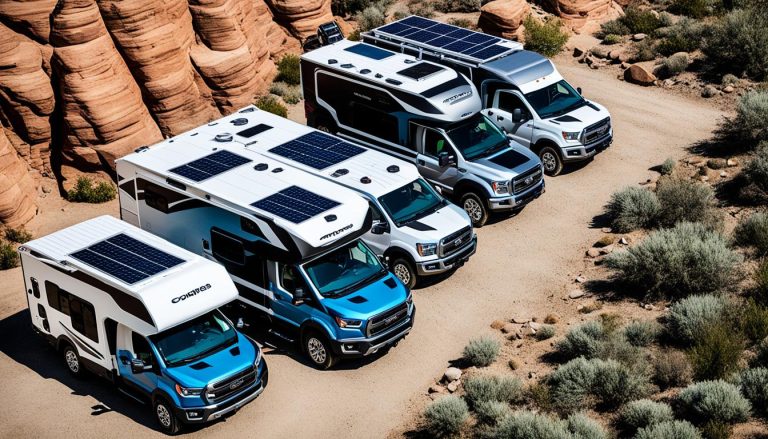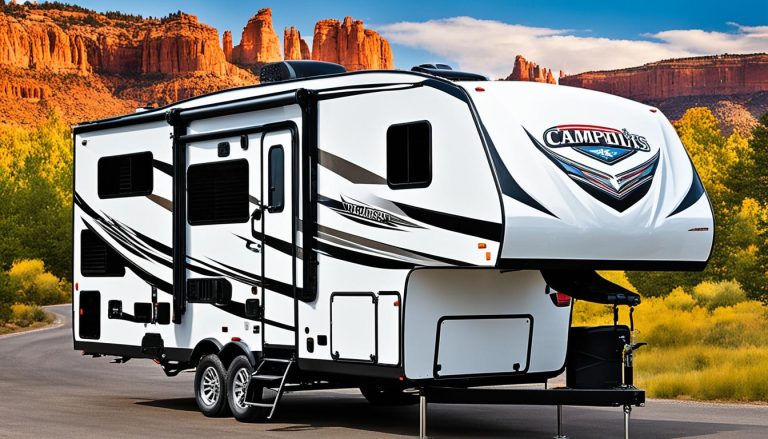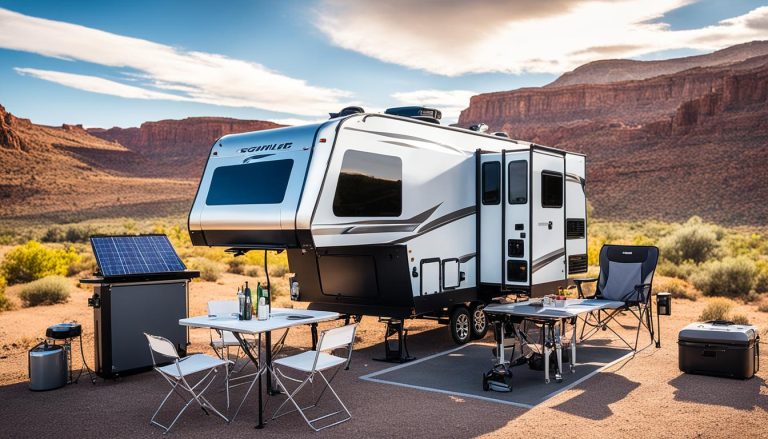Maximize Profit: Tips for Selling a Towable RV
gorvlifestyle.com and its partners may earn a commission if you purchase a product through one of our links
Embarking on the journey to sell a towable RV can lead to exciting new roads, but it’s no secret that the endeavor requires smart strategy and informed decision-making. As the market for recreational vehicles thrives, sellers hold lucrative opportunities in the palm of their hands to deliver the dream of travel to enthusiastic buyers. To effectively sell your camper while maximizing return on investment, it is crucial to understand the intricacies of RV selling tips and position one’s travel trailer to stand out among the many towable RVs for sale. From pre-sale sprucing up to finalizing a transaction, certain steps can elevate the selling experience from daunting to highly rewarding.
Armed with practical knowledge and a strategic approach, individuals can navigate through the process with confidence, securing the best possible offer for their beloved RV. It is about more than just placing an ad; it’s about creating an allure that captures the adventurous spirit of potential buyers and assures them that this is not simply a purchase, but an investment in a lifestyle rich with freedom and discovery. Let’s jump into the driver’s seat and explore essential tips that can lead any seller to the sweet destination of a successful sale.
Key Takeaways
- Grasp the nuances of RV depreciation and timing your sale to optimize profits.
- Learn how to present your towable RV in the best light, capturing the imaginations of potential buyers.
- Discover the pros and cons of various selling channels, from private sales to dealership trade-ins.
- Embrace current RV market trends, like technological enhancements and sustainable features, to attract a broad audience.
- Invest time in pre-sale preparations, ensuring every corner of your RV shines and all systems function flawlessly.
- Understand your RV’s value with tools like KBB and NADA Guides to set a competitive and fair price.
- Enhance your online listing with engaging descriptions and striking visuals for maximum impact on specialized selling platforms.
Understanding the Towable RV Market Dynamics
As the landscape of leisure travel shifts, the towable RV market experiences significant changes in consumer demand and preferences. The RV selling process has had to adapt, making it important for those selling their travel trailer to understand the influencing factors if they hope to sell an RV quickly and profitably.
The Increasing Demand for RVs Among Different Demographics
There has been a notable surge in interest for RVs spanning across various age groups and lifestyles. Millennials, in particular, are valuing the freedom and flexibility that come with owning a towable RV. Recognizing this demographic shift can be a crucial aspect for sellers aiming to market their RV more effectively to a broader, more dynamic customer base.
Technological Advancements and Their Impact on Towable RV Sales
Next-generation technology integration has become a pivotal selling point. The introduction of smart home features and cutting-edge navigation systems are elevating the standards of modern RVs. Sellers highlighting these advancements can significantly enhance the appeal of their RV, making it stand out in a competitive market.
Sustainability as a Selling Point for Modern RV Enthusiasts
The green movement has made its way into the RV industry, with a growing number of travelers emphasizing sustainable living, even on the go. Investments into eco-friendly features or improvements in an RV can not only attract environmentally conscious buyers but can also justify a higher asking price due to the increased perceived value.
| Customer Demographics | Technology Preferences | Eco-Friendly Considerations |
|---|---|---|
| Millennials seeking adventure and flexibility | Smart home automation systems | Renewable energy sources (solar panels) |
| Baby Boomers embracing nomadic retirement | State-of-the-art navigation and safety features | Efficient waste management systems |
| Remote workers desiring mobile offices | High-speed internet connectivity | Materials and build processes with reduced environmental impact |
Staying attuned to these influential factors can profoundly positively impact your RV selling process, ensuring a quicker and more lucrative transaction when selling your travel trailer.
Pre-Sale Preparation: Enhancing Your RV’s Appeal
Before you list your recreational vehicle on top RV selling sites, it’s crucial to maximize its potential to attract serious buyers. Impressive pre-sale preparation not only boosts your RV’s aesthetic appeal but can also significantly enhance its value. Here are some fundamental RV selling tips to ensure your RV stands out in the competitive market.
- Perform a deep clean, tackling every nook and cranny. A sparkling interior and exterior can make a memorable first impression.
- Address all repairs, including the minor ones. A well-maintained appearance speaks volumes about the care you have given to your RV over the years.
- Ensure all systems are functioning properly. A smooth operation during inspections can reassure potential buyers of your RV’s reliability.
A survey of repairs and improvements can provide a quick reference for buyers and illustrates transparency in the selling process. Here’s a consolidation of updates that can bolster the sale:
| System | Condition Before | Improvement Made |
|---|---|---|
| AC Units | Functional with minor noise | Professionally serviced and parts lubricated |
| Water Pumps | Slow pump rate | Replaced with new efficient model |
| Furnaces | General wear and tear | Cleaned and worn components replaced |
| Awnings | Minor tears present | Repaired tears and cleaned fabric |
Investing time in these pre-sale preparations not only positions your RV favorably on the market but also gives you an edge. By showcasing a well-maintained and fully operational RV, you tap into the mindset of the buyer who’s looking for quality and readiness in their home on wheels. With these efforts, your listing on the top RV selling sites will not only attract attention but also incentivize a quicker, potentially more profitable sale.
Setting the Right Price: Evaluating Your Towable RV’s Worth
When you’re ready to sell my camper, it’s imperative to hit the market with the right price. Setting a competitive and fair asking price for your towable RV is a nuanced balancing act that takes into account various factors, from the vehicle’s condition to the vibrancy of local RV markets. By doing so, you’ll attract serious buyers and stand a good chance of making a successful sale.
Tools for Assessing RV Value: KBB and NADA Guides
To establish a well-informed price point, resources like Kelley Blue Book (KBB) and NADA Guides are invaluable. These platforms offer estimates that are tailored to the specific make, model, and year of your RV, guiding you towards a price that reflects its fair market value. Don’t forget to consider key updates or enhancements your RV might have, which could potentially increase its worth.
The Importance of Condition and Mileage in Pricing
Condition and mileage are critical determinants in the valuation process. A well-maintained camper with lower mileage is likely to fetch a higher price. Be transparent about the RV’s current state and maintain records of its service history and any repairs or upgrades made. This documentation can justify your asking price and give potential buyers confidence in the longevity of the purchase.
Local RV Market Influences in Pricing Strategies
Understand that the local demand in areas like Los Angeles or Orange County can drastically sway the price range for your camper. By conducting market research or consulting with local RV dealers, you can gauge the popularity of certain RV models and set a price that resonates with the regional buyer’s market. Seasonal trends can also impact the best time to sell for the highest possible price.
Use these insights to strategize your asking price effectively, keeping in mind that RV selling tips often emphasize the importance of flexibility. Being open to negotiation can be the key to a successful transaction, ensuring that you sell your camper promptly while still obtaining a fair deal.
Selling a Towable RV: Online Platforms vs. Dealerships
When it comes time to sell a travel trailer, owners are presented with a crucial decision: leveraging the expansive audience found on online platforms or opting for the speedy transaction offered by dealerships. Each avenue has its unique set of advantages and challenges.
Online platforms are particularly alluring for those looking to sell their RV due to their capacity for detailed listings that reach a wide audience. A seller can craft an extensive description, highlight all the travel trailer’s features, and upload multiple images to platforms such as Facebook Marketplace and Craigslist. This form of listing suggests the potential for securing a better deal; however, it typically requires more time and effort from the seller to find the right buyer.
Conversely, dealerships facilitate a more rapid selling process. Upon deciding to sell my RV through a dealership, the process becomes largely hands-off for the seller. Although it’s true that dealerships tend to offer lower purchase prices, the convenience of this method is often its selling point—particularly for those looking to make a quick sale without the hassle of managing listings and meeting with prospective buyers.
| Selling Outlet | Reach | Control Over Sale | Time to Sale | Potential Sale Price |
|---|---|---|---|---|
| Online Platforms | Broad | High | Variable | Potentially Higher |
| Dealerships | Limited to Local | Low | Fast | Lower (Quick Convenience) |
Ultimately, the decision of whether to sell my RV on an online platform or through a dealership boils down to the seller’s individual circumstances and needs. Factors such as the demand for the specific type of travel trailer, the urgency of the sale, and the seller’s willingness to interact directly with buyers will shape this critical decision.
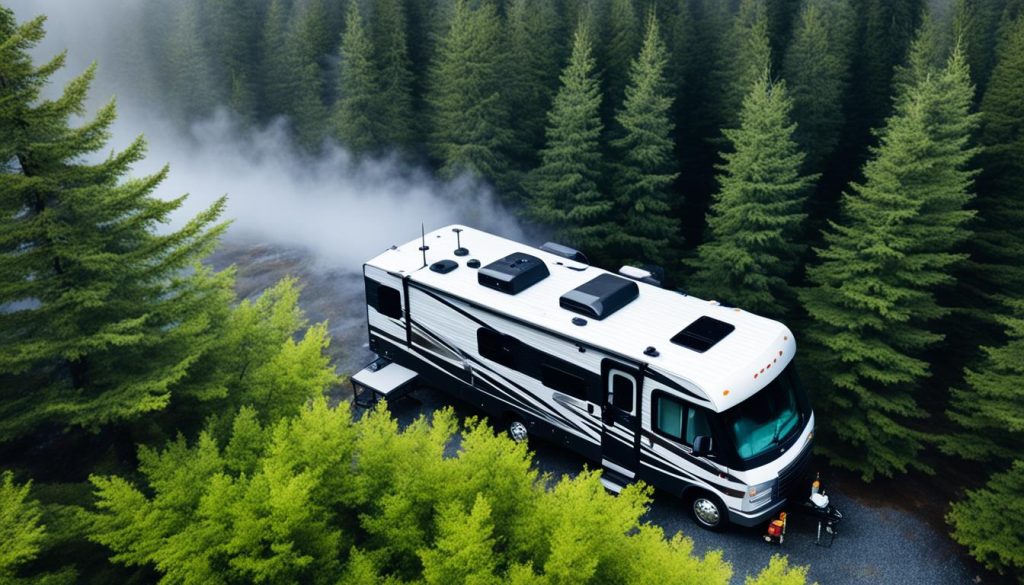
For those focused on selling my travel trailer for the highest possible price and who are not averse to investing some time, the broader audience of online platforms may be appealing. However, for sellers prioritizing speed and convenience, with less concern for maximizing profit, dealership sales offer a compelling argument. Weighing these considerations carefully will guide RV owners to the most appropriate selling channel for their unique situations.
Pros and Cons of RV Dealership Trade-Ins
Engaging in the RV selling process often leads one towards considering a dealership trade-in. This method promises a swifter transaction, cutting through the complexities often associated with private sales. Yet, the convenience comes with its considerations that must be weighed to ensure the journey of how to sell an RV quickly also aligns with your financial expectations.
Navigating Dealer Offers and Negotiations
Entering negotiations with a dealership requires knowledge of your RV’s worth and an understanding of the dealership’s business model. They strive to make a profit, which means their initial offer will likely be below market value to leave room for their own margins. The key to navigating this aspect of the RV selling process is preparation and willingness to negotiate.
Understanding the Trade-off Between Convenience and Profit
The allure of convenience when trading in your RV at a dealership is undeniable. The quick turnover, handling of paperwork, and immediate release from responsibility are indeed persuasive. However, this convenience often comes at the cost of achieving a higher profit from the sale, compelling sellers to balance their desire for speed with their need for financial return.
Dealer Sales’ Impact on Sale Timeframe and Pricing
For many, the dealership trade-in process offers an attractive expedited path to sell, markedly quicker than private sales avenues. Yet, this rapidity can influence pricing, with dealerships often presenting lower offers to account for their subsequent sales efforts and the depreciation factor on your vehicle.
When considering a trade-in, it is beneficial to view the pros and cons side by side:
| Pros | Cons |
|---|---|
| Quick Sale | Lower Offers |
| No Need for Personal Advertising | Less Negotiating Power |
| Dealership Handles Paperwork | Trade-In Value May Not Account for RV Upgrades |
| Immediate Transfer of Ownership | Potential for Lesser Profit Than Private Sale |
Understanding these factors is essential for sellers navigating the RV selling process, especially when the goal is to learn how to sell a RV quickly. Being aware of these trade-offs can empower sellers to make decisions that align with their financial goals and timeline expectations.
Creating an Engaging Online Listing for Your Towable RV
When you’re ready to sell my camper, the quality of your online listing can make all the difference in catching the eye of eager buyers. By crafting a compelling description, including striking visuals, and optimizing your post timing, you can enhance the appeal and visibility of your towable RV on the top RV selling sites. Below are RV selling tips that can help you turn your listing into a magnet for potential customers.
Crafting a Compelling Description and Selecting Striking Photos
The description of your RV is your chance to tell its unique story and highlight its best features. Aim for a blend of informative and persuasive language that underscores its value proposition – be it the cozy mid-bunk, ample storage space, or cutting-edge amenities. Accompany your text with high-definition photos that showcase your towable RV in its best light. Ensure all key areas, both inside and out, are well-represented. The power of a strong visual narrative cannot be overstated.
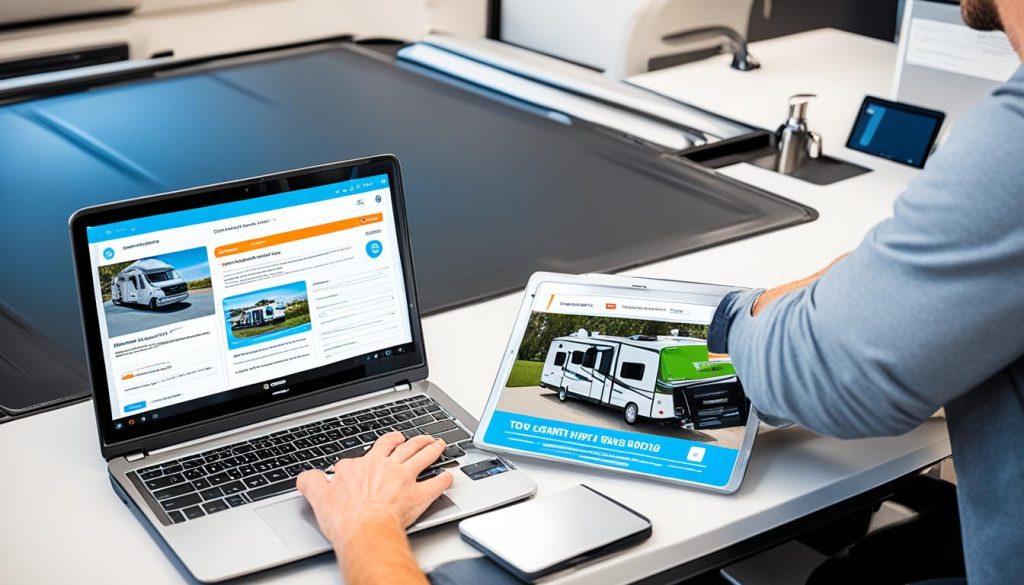
Leveraging Social Media and Specialized RV Selling Sites
Expand your reach by leveraging social media platforms and specialized RV selling sites such as RVT.com. A well-placed ad on these sites, coupled with engagement in local Facebook groups and online communities, can greatly increase your visibility. Each platform attracts a different audience, so crafting a tailored strategy for each is key. Utilize effective hashtags, join regional RV groups, and engage with your audience to drive more traffic to your listing.
The Role of Timing and Seasonal Demand in Online Selling
Selling your camper isn’t just about the ‘how,’ but also the ‘when.’ Seasonal demand influences buyer behavior, with a noted surge after the holidays. Consider the ebbs and flows of the market to determine the optimal time to list your RV. A well-timed listing can harness the momentum of peak buying seasons, translating to more inquiries and a faster sale.
- Compose a detailed description highlighting key features
- Upload high-quality, clear photos of the RV
- Choose selling platforms that align with your target buyer demographics
- Time your listing to coincide with periods of high buyer activity
- Engage with potential buyers promptly and professionally
RV Consignment: A Hybrid Selling Option
When it comes to selling a Towable RV, owners are often seeking ways to combine the benefits of private sales with the convenience of dealership support. RV consignment emerges as a unique approach in the RV selling process, promising to simplify the journey of transferring your towable home to its new owner. Unlike the direct hand-off in a private sale or the immediate relinquishment in a dealership trade-in, consignment allows the seller to maintain ownership until the moment of purchase; offering a blend of control and professional assistance.
Engaging the services of a reputable consignment dealer, such as Camping World, can significantly ease the selling experience. They take over various tasks that might otherwise be overwhelming, including effectively marketing the RV to a broad audience, performing thorough inspections, and dealing directly with potential buyers. This results in a more standardized process, where the consignor can enjoy the perks of professional salesmanship while still holding ownership.
That said, utilizing a consignment service is not without its costs. Typically, a seller might expect to pay commission fees that range between 10-15% of the sale price. It is essential to weigh these costs against the potential benefits of convenience and exposure. To aid in making an informed decision, consider the following comparison:
| Consignment Aspect | Benefits | Considerations |
|---|---|---|
| Preparation and Advertising | Handled by the dealer, saving time and effort. | Commission fees cut into profit margins. |
| Ownership Control | Retain title until the sale, allowing for potential use. | May have a set timeframe to sell, affecting opportunities. |
| Exposure to Buyers | Increased reach through dealership networks. | Profit may be affected by the consignment dealer’s commission. |
While the consignment dealer handles the brunt of the transaction, the towable RV is showcased to prospective buyers, increasing the likelihood of a timely and profitable sale. Therefore, RV consignment can be an attractive route for those who prefer not to manage the complexities of selling privately but still wish to avoid the potential undervaluing that can occur with dealership trade-ins.
Ultimately, whether or not RV consignment is the best avenue for selling your towable RV hinges on your personal preferences, timeline, and financial considerations. For sellers who prioritize maximum control and profit and are willing to navigate the sale independently, a private sale might be more fitting. However, for those who value convenience, support, and a potentially quicker sale, consignment offers a harmonious balance that might just be the perfect compromise between effort and reward.
Legal and Financial Considerations When Selling a Towable RV
When considering to sell my RV, it’s not just about creating an appealing ad or finding the right buyer. There are significant legal and financial aspects to keep in mind—each helping to ensure a secure and compliant transaction. It’s imperative to manage ownership documents, confirm payment security, and understand ongoing liabilities accurately for a successful sale. Ignoring these could mean facing challenges that affect both your pocketbook and legal standing.
Handling Ownership Transfer Documentation
The transfer of ownership is a critical part of the RV selling process. Detailed and accurate documentation is the cornerstone of a legitimate transaction. Sellers must provide the title and any other necessary papers that will shift the ownership to the buyer. Below is an outline highlighting essential documents and steps involved:
- Bill of Sale: This document records the transaction details and establishes the transfer of ownership.
- Title Transfer: Signing over the RV title to the new owner is a legal necessity.
- Odometer Disclosure: Federal law requires the disclosure of the RV’s accurate mileage.
- Release of Liability: Varies by state, this form shields the seller from future tickets or violations after the sale.
Securing Payment: Best Practices for a Reliable Transaction
To sell my RV smoothly, you’ll need to ensure that you receive reliable payment. Here’s how:
- Verify the buyer’s ability to pay, whether by cashiers’ check, wire transfer, or another secure method.
- Never relinquish possession of the RV without confirming the payment has cleared.
- Consider using an escrow service for added security, especially for higher-value transactions.
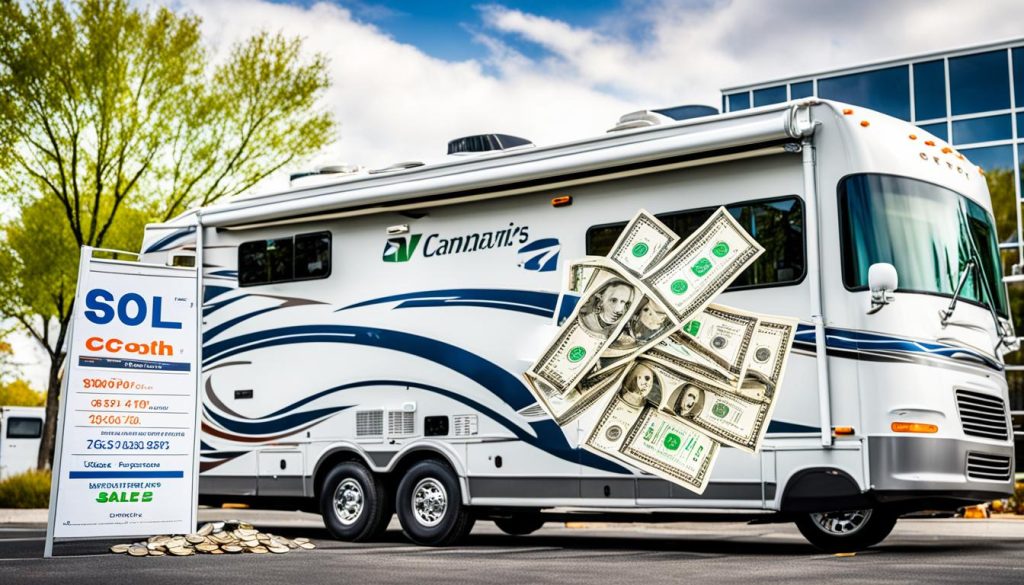
Insurance and Liability During the Sale Process
Sustaining insurance coverage throughout the selling process is a critical safety net. It protects both parties if incidents occur before the final sale. Confer with an insurance agent to elucidate the duration of your coverage and when the buyer’s insurance should take effect. Important points include:
- Insurance should cover the RV until the final transfer is complete and the buyer has taken possession.
- When consigning, confirm the consignee’s insurance policy includes coverage for your RV on their lot.
- Ensure the release of liability is secured to fend off any post-sale responsibilities connected to the vehicle.
Grasping these RV selling tips and legal measures can solidify your position as a seller who is both informed and attentive to the pivotal details of an RV transaction.
Marketing Your Towable RV: Advertising to Potential Buyers
When it comes to selling a Towable RV, successful marketing strategies are key to drawing in potential buyers. Listing your towable RV for sale requires not just broad exposure, but reaching those who are most likely to be interested. This involves a nuanced approach to crafting your message and selecting platforms that are frequented by RV enthusiasts and prospective buyers.
Advertising on online marketplaces has proven to be effective for reaching a large audience. However, sellers should be mindful to create ads that resonate with buyers, balancing detailed information and appealing visuals.
Engagement on social media platforms is another powerful method to connect with potential buyers. Utilizing platforms such as Facebook’s targeted ads or Instagram’s visual appeal can greatly increase visibility to interested parties.
- List your RV on multiple online classifieds tailored to RV sales.
- Create social media posts with high-quality images and thorough descriptions.
- Use hashtags related to RV living and sales to improve searchability.
Creating an advertisement that is both compelling and honest is crucial. Here are some tips to avoid the pitfalls that can reduce interest in your RV:
“Always provide clear and high-quality photos from different angles, both interior and exterior. Highlight key features that add value, such as any custom upgrades or recent maintenance. And always be forthcoming about any issues or wear and tear.”
The competitive nature of the Los Angeles RV market demands that your listing stands out. Your ad copy should be clear, concise, and feature all the necessary details to inform and attract prospective buyers. Consider this aspect to be the virtual “curb appeal” of your towable RV.
Lastly, timing can be everything. Launch your advertisements leading into peak RV-buying seasons to capitalize on increased market activity and interest. By synchronizing your sale with times of high demand, you are much more likely to achieve a successful and lucrative transaction.
Prepare Your Towable RV for a Quick Sale
Positioning your towable RV to move quickly off the market requires a keen eye for detail and an understanding of what potential buyers are looking for. In anticipation of making that sale, sellers should focus on enhancing the visual and operational quality of their RV. With a clean, functional, and inviting environment, you amplify the RV’s appeal, thereby increasing the likelihood of a quicker sale. Dive into the intricacies of what it takes to groom your recreational vehicle for prompt selling success.
Detailed Cleaning and De-Cluttering Techniques
Embarking on an extensive cleaning routine is the first step towards making your travel trailer inviting. Start with a deep clean that leaves no corner untouched – from ceiling panels to the flooring, every surface should sparkle. Clearing out personal items and diminishing clutter not only gives the impression of a capacious area but allows buyers to envision themselves in the space. This goes a long way when attempting to sell an RV quickly, as a spotless presentation can dramatically enhance a buyer’s first impression.
Repairing Damages and Ensuring Operational Mechanics
Next, address any functional flaws within your travel trailer. Prospective buyers will likely be scrutinizing the mechanics and integrity of the towable RV; thus, sellers should ensure all systems are in top-notch condition. This includes anything from minor cosmetic damages to more significant concerns like the water pump or electrical circuits. Ensuring that each component, be it the HVAC systems or the refrigerator, operates flawlessly adds immense value and can be a strong selling point for those looking to purchase an RV sans the hassle of immediate repairs.
Staging the RV Interior for Maximum Impact
Finally, staging your towable RV can powerfully transform it from a functional living space to an aspirational home on wheels. It’s about striking the right balance between practicality and style: soft, comfortable textiles convey warmth, while strategically placed lighting can create an ambiance of coziness and space. By presenting a staged interior, you not only showcase the RV’s potential but also reinforce the care and attention invested in maintaining the vehicle, making the proposition to “sell my camper” all the more compelling to the buyer.

